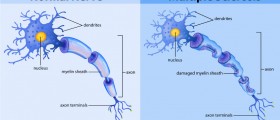
Even though passing by trashcans or some neglected public toilets makes us desire we never had our sense of smell developed, this capability of ours is incredibly important for us. Basically, smell gives our existence a new perspective, helping us recognize objects, places, and various other items present in our lives. Also, it helps us create memories and categorize things around us, among many other benefits.
Unfortunately, some people cannot have these abilities, due to the fact that they have lost, or they have never had, the sense of smell. This condition is called anosmia.
Loss of Smell – Anosmia
The loss of smell, or anosmia, can be either partial or complete, depending on its severity. Many individuals suffer from partial loss of smell, while complete loss of this type is not frequently seen. Usually, the type of anosmia depends on the underlying cause behind it.
Nevertheless, not having a sense of smell can result in losing interest in food. This loss of appetite can lead to weight loss and various other health issues. Basically, our food consumption is strongly influenced by our sense of smell. Therefore, once this sense is lost, our cravings and appetite itself are bound to change.
Due to the fact that anosmia is caused by the damage done to the mucous membranes inside the nose or irritation to the area, various factors can be the culprits behind it.
Causes of Anosmia
For example, anosmia can stem from acute sinusitis, which is a type of sinus infection. Moreover, even a common case of cold can lead to loss of our sense of smell, in some cases. The notorious viral infections caused by influenza, or flu, adds on to the list of causes. Finally, a condition called non-allergic rhinitis, leading to chronic congestion or sneezing can be the trigger of anosmia too.
There are many more from where these came from, even though they do not need to be connected to the external factors. For instance, deformed bones in the nasal area, presence of nasal polyps or even tumors inside the nose, all can lead to this condition, creating obstructions in the nasal passage, making it impossible for you to fully experience the sense of smell.
Nerve damage or brain damage can be responsible for anosmia as well, being caused by numerous factors including aging, aneurysms, tumors, surgeries, malnutrition, certain medications, rhinoplasty, schizophrenia, radiation therapy etc. Even some diseases like Parkinson's, Korsakoff's psychosis, Huntington's or Kallmann's syndrome can take one's sense of smell away.
Usually, if the anosmia is caused by some temporal factors like the common cold, it will disappear along with the disease. However, in cases of chronic problems, this condition is likely to bother a person for longer periods of time. Thus, if you happen to suffer from loss of the sense of smell, lasting for more than a couple of days, contact your health provider and seek medical assistance.
Associated Conditions
Among all the above mentioned causes, there are several more which can lead to anosmia indirectly. According to the FDA, these are dysosmia, Zinc deficiency, Cadmium poisoning, holoprosencephaly, primary amoebic meningoencephalitis caused by Naegleria fowleri, CHARGE syndrome, ageusia, and refsum disease. Taking into consideration that these diseases are quite rare, you are advised to learn more about them in order to seek explanations for any problems related to loss of the sense of smell.
Also, keep in mind that smoking decreases you power to sense smells, along with various chemicals you expose yourself to often, especially those which come from heavy metals, inorganic and organic compounds, pollutants and acids.
Drugs like amphetamines and other stimulants can affect your sense of smelling too, along with some antibiotics and nasal sprays.
As far as the US Food and Drugs Administration is concerned, on June 16, 2009 they sent a letter to Matrixx Initiatives, a company which produces nasal sprays which help people deal with the symptoms of common cold, expressing their concerns regarding the product. Basically, the FDA claimed that Zicam, the spray, triggers anosmia. The whole affair ended with removing the product from the market and cessation of its production completely, even though Matrixx Initiatives denied the allegations.
Therefore, you should be very careful with nasal sprays and similar drugs, avoiding getting your sense of smell compromised and developing anosmia.
All in all, anosmia stands for one's inability to smell. It is a condition which can be partial or complete, depending on various factors. Also, many different causes can lead to anosmia, ranging from injuries, over diseases, to exposure to certain medications or chemicals.
Either way, bear in mind that aging takes away our sense of smell gradually. However, do not forget that the nerves responsible for smelling can regenerate. Thus, if anosmia is a problem you are dealing with, do not give up and do not ignore it or neglect it. Rather, seek medical assistance as soon as you notice that your sense of smell is fading or lost, diagnosing the problem behind it and starting adequate treatment procedure.
















Your thoughts on this
Loading...